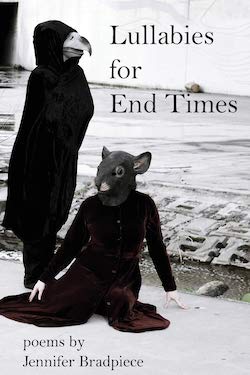
But these poems also disturb. The soothing is the surface, but there is a strong undercurrent of dread throughout this book. To soothe is not to ignore. The loss is still there in these poems, sometimes front and center, sometimes only alluded to. The opening poem, “Lullaby for Emergencies,” sets the stage.
A siren splits the night
like a diver unfolds through water
in a still pond.
Like no siren ever divided silence before.
Like the drink in my hand tickles my throat,
and scatters my thoughts like a shooter marble.
…
From somewhere up above me,
the siren cries out:
one sharp glowing ring-shaped punch
to the straight slate line of night sky.
We’ve all been there, hearing the distant siren, wondering what tragedy has happened, and to whom. We know it always lurks, waiting, perhaps, for our turn. In “Lullaby for the Enemy” it is ever present:
Don’t you smell it —
musty between sleeves
of undusted books?
Tell me you feel it —
heavy, yet sharp
like a paper cut
buried in the stack
of unopened mail?
…
Don’t you know? The whole
goddam world is toxic. I must put
it in order, control each hand-wielded
rationally dreamt thing. Look, look —
this is where it hides, how it finds me,
the way it comes — the pain —
it grows here, that enemy.
Bradpiece mines a variety of topics for this dread. There are poems about Miss America, lawn furniture, Venice, snooze bars, and much more. There are narratives, travelogues, portraits. But all of them still have that undercurrent. “Lullaby for Snooze Bars” catalogues the nightmares we have in those instants before waking; “Lullaby for Thirsty Lawn Furniture” describes those items rotting in the sun and drought, perhaps a post-human world. “Lullaby for an Afternoon” captures the feel of fading light at the end of the day, but also focuses on the sadness of it.
The imagery of these poems keeps the disaster at a distance, to soften the blow. Take “Lullaby for a Dog,” about putting a pet down. Short clinical passages — “The formica table is cold as January” “A faint, awful sucking sound. A vial/ is filled, then another” — are set among lyrical passages describing an afternoon in Joshua Tree. The poem opens with, “I will revisit a place/ I wanted to stay./ I will take you with me.” And closes with:
But come back with me
to the warm pavement below.
Well, cooling now.
Now the moon and sun face off
gently, and the sky goes indigo.
The silence here is so dense, listening
is like biting into rawhide. Over my head,
suddenly two sparrows.
Or “Lullaby for My Mother,” tenderly describing a remarkably similar scene:
My love was priest to my dying mother.
When he said: Grace and compassion.
When she confessed to finally courting silence.
When she said: Sleep.
…
When she said: No more pain.
When it rippled her softly back through time’s keyhole.
When he said: Jane, we are grateful.
When the dog gingerly sniffed the bed,
bowed his head, and backed away.
There is an acceptance of death here, but also a sense that it is not the end. The dog can still come back to the warm pavement. These are lullabies, not elegies. For all the loss in these poems, there is no sense of finality. She is not saying farewell to the objects of these poems, just singing them to sleep. There is always a sense that they will awaken again, come back to us. “Lullaby for the Dead” is most explicit on this idea that the dead aren’t really gone:
The dead don’t
get around much anymore.
…
Still, holidays are
less stressful
for the dead.
Their daybooks linger
open in the middle of
an empty table:
to-do lists short
as winter days
and no use for
day coats.
The pleasures of these poems lies in this tension, between a soothing surface and underlying pain. Bradpiece achieves a delicate balance here, addressing grief, loss, and the challenges of today’s world, without overwhelming us, in fact, calming us.
